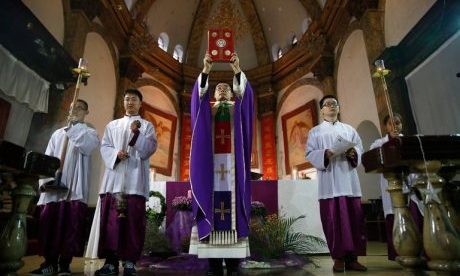“We cannot command our final perseverance, but must ask it of God.” — St. Thomas Aquinas
“St. Peter is the leader of the choir, the mouth of the apostles and the head of that tribe, the leader of the world, the foundation of the Church, and the ardent lover of Christ.” — St. John Chrysostom
Few issues have plagued China-Vatican relations since the founding of the People’s Republic of China in 1949 more than the question papal authority.
China’s political leaders remain uncomfortable with foreign leaders exercising power over Chinese citizens, and Chinese Catholics are among the only people in China who submit to an outside power.
In 1951, China’s new communist government committed itself to solving the problem of the “foreign pope” by installing a Chinese one. Party officials approached the Vincentian archbishop, Joseph Zhou Jishi, and invited him to be the pope.
Zhou responded that he would be happy to serve as pope, as long as his election was made by the cardinals of the Church in Rome, and that once elected he would live and lead the entire Catholic Church from his papal apartment at the Vatican.
For his answer, Archbishop Zhou was arrested in May 1951, subjected to three “people’s trials,” and sent to prison.
Since 1949 China’s Catholics have struggled to find ways of remaining loyal to the successor of St. Peter that assuage the government’s requirement to obey the pope in only “spiritual matters,” and not in areas of administration.
This situation has created a painful sense of separation between Chinese Catholics and their spiritual leader in Rome, and an expression of this pain was observed recently during the March 15th general audience with Pope Francis at St. Peter’s.
Pope Francis allowed a group Chinese pilgrims to pass through the barrier of Swiss Guards and Vatican carabinieri, approaching him on their knees and sobbing.
These Chinese Catholics passed a few tender moments with the successor of the leader of the apostles. No pope has ever visited China, today he remains forbidden from visiting his flock in the Middle Kingdom.
While one pilgrim performed the traditional Chinese gesture of obedience, the kowtow, another asked him to bless their statue of Our Lady of Fatima.
There are two realities that define China’s Catholics: Today they are sustained by their abiding devotion to Jesus Christ, and they are plagued by their abiding struggle to navigate between a political requirement to remain distanced from the pope of Rome and a spiritual requirement to submit to his authority.
Recent events in China highlight the complexities of this situation. Continue reading
Sources
- Catholic World Report article by Anthony E. Clark, an associate professor of Chinese history at Whitworth University.
- Image: New York Times
